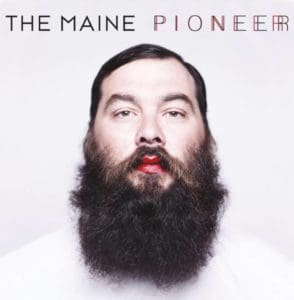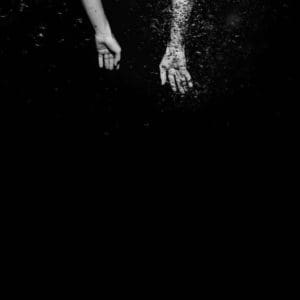Written By Laura Curry
Enthusiastic fans braved the cold, briny wind to queue up hours in advance, hoping to assure prime standing spots at The Maine’s sold out, general admission show at The Stone Pony. Their Asbury Park, NJ performance kicked off the last leg of their North American Tour with The Mowgli’s and Beach Weather.
Before the show, The Pop Break met with The Maine’s drummer Pat Kirch, whose disarming smile instantly relaxed any anxious energy. We sank into the worn leather couch in The Stone Pony’s green room to talk about the dramatic changes from album to album, Lovely Little Lonely’s cohesive sound, the evolution of their recording process and the importance of the 8123 crew.
For those who don’t know The Maine, they are a five-piece alternative pop rock band from Tempe, Arizona. They got their start back in 2007 when they were still in high school, which made their music very relatable to teenagers. They’ve played alongside bands like Boys Like Girls, Taking Back Sunday and All Time Low. They have 6 full-length albums and a multitude of EP’s under their belts along with countless U.S. and world tours.
On a personal note, each one of The Maine’s albums represents a different mile marker in my life over the past 10 years, which is a feeling shared by many fans. Kirch agrees that he looks at each album in a similar way.
“I kind of go by time period – I think my life is divided up into two-year chunks – that’s how long we took to put out each record,” Kirch said. “It gets interesting to look back and realize you divide it up by albums. It’s a weird way to live a life, I guess, but it’s fun.”
As for albums that stand out as major changing points for the band, Kirch simply says that they all are.
“That’s just because we’ve kind-of changed our sound pretty dramatically,” Kirch said.
https://www.instagram.com/p/BTcnPqZghxW/?taken-by=themaineband
Their first full-length record, Can’t Stop Won’t Stop gave listeners the sound that they expected from The Maine based on their previous EP’s: catchy, relatable pop-rock with Callaghan’s distinctive vocals that we all tried to recreate but couldn’t master.
Black and White, their second album, hit fans with a change that had them wondering if they were a whole new band, Kirch explained. Each album elicited a similar response from listeners and they are all a necessary part of The Maine’s identity.
“Without each album, the next one couldn’t have happened,” Kirch said. “We just don’t want to make the same album over and over again. So I think that’s why every time, we make pretty dramatic turns with what we do with the sound.”
He thinks that their classic rock-tinged record, Pioneer, was the most dramatic change for them, as plenty of listeners may agree.
“There are people who are going to like it and others that just won’t,” Kirch said. “That’s fine. I think that really set us free from feeling like we had to make a certain kind of record or be a certain kind of band; we could just be what we wanted to be at that time.”
Pioneer also marked an expedition into new territory for the band, since it wasn’t the sound that their label wanted. After a year-long struggle involving contractual obligations, they were able to release the album outside of the record deal. In response to this conflict, The Maine created its own record label and management team, called 8123, which was inspired by the address of a parking garage that was a frequent hangout spot back in high school.
Those who grew up listening to The Maine are sure to have found meaning in their inspirational lyrics. Of all the enlightening words of their music, Kirch stays true to the mantra of “We’ll All Be” with choosing the lyrics “We all have been degraded, we all will be the greatest.”
“That was the first time that we wrote a song for a purpose,” Kirch explained. “We were writing it to end the record in a certain way and to evoke a certain kind of emotion, and I think we did that. It was really early on, so it just reminds me of fun times like being in a band for the first time, and being in high school … And John has those words tattooed on his chest, so it obviously means a lot to us.”

As far as the main message of Lovely Little Lonely, Kirch said it’s about the emotion that they get from the album. “We really wanted to make a record that had a consistent feeling,” he said.
Kirch explains that there is a cohesive sound to the album, centering on a combined feeling of happiness and sadness, which is clear to listeners in tracks like “Taxi,” “Do You Remember? (The Other Half of 23)” and “The Sound of Reverie.”
The transitional track “Lost in Nostalgia,” includes a very fitting word for this album. The idea of nostalgia, or longing for the happy memories of our past when life felt simpler, is explored in the songs. Listeners will find themselves reflecting on their own lives and feeling bittersweet.
“I think that’s generally how most people feel in life—they’re not going to be happy all the time,” Kirch said.
Perhaps the mantra of the album is found in the track “Little,” with “Wherever you are is just where you’re at, not where you’ll always be.”
For Kirch, Lovely Little Lonely has a strong sensory impact, as it’s easy to imagine the feelings and situations explored on the record while he’s listening to it. Thinking back to their previous release, American Candy, he realizes another difference between the two.
“American Candy was just a fun album to put on if people wanted to dance in their room, but this one takes you on a little more of a journey with us,” Kirch said.
The recording process of their albums led them on a journey of their own to discover what works best for them. Their first two albums were recorded in LA, and with such a large team of people working on them, the band felt like their music didn’t take priority. There was too much happening around them, which prompted them to change it up.
“For us, it was just like, let’s get a place where this is the only thing that matters,” Kirch said. “We figured why spend all this money on going to a recording studio that’s in a crappy part of town and super expensive to be in and it’s not inspiring, when we can just be out in nature and have cool things to look at when we need a second to breathe?”
From then on, The Maine recorded music in secluded locations, surrounded by nature in places like Sacramento, Joshua Tree, and most recently with Lovely Little Lonely, in Gualala, California at a Airbnb on a cliff.
https://www.instagram.com/p/BM4JmzMAGlb/
The writing and recording process for Lovely Little Lonely was a bit of a struggle because of the pressure they put on themselves, Kirch said. They had a clear vision of how they wanted the album to sound, which made them much more selective with choosing songs to fit the album’s vibe.
“If it didn’t have the emotion, sound and feeling we wanted the whole album to have, we wouldn’t put it on there. It took a lot of work to get enough songs that hit the bar. It was definitely the most challenging [album]. On some records we wouldn’t even think about it. With this one, we were really hard on ourselves, but now we’re just so happy with how it sounds.”
Fans are clearly thrilled with the sound of Lovely Little Lonely, as it came out on April 7 and they’re already screaming the lyrics of the new songs at shows. These concert-goers don’t need to worry about purchasing exorbitantly priced VIP packages or meet and greets that might give them a better experience of The Maine, because everyone is equal at their shows.
“We just think that going to a concert is supposed to be fun,” Kirch said. “We try to treat everybody the exact same way. You pay for your ticket, you get into the show and you get the same show.”
https://www.instagram.com/p/BTMqSR8ARvE/?taken-by=themaineband
What fuels Kirch’s passion for music are the fans and the knowledge that their songs will be around to impact the lives of future generations.
The Maine’s music makes a lasting impression, as it helped shape the person I am today and it will always be a part of me. Countless fans share these feelings and their love for The Maine is everlasting. Kirch is grateful to all of their listeners, and he’s more than willing to let them know.
“We’ve built this community of people who are all friends because of our music,” Kirch said. “In the past couple years especially, the 8123 crew has just gotten bigger and bigger. That definitely is a huge inspiration to keep going. People care, so why wouldn’t we want to do it? And for us, it’s just the most fun thing in the world. I wouldn’t want to do anything else.”



